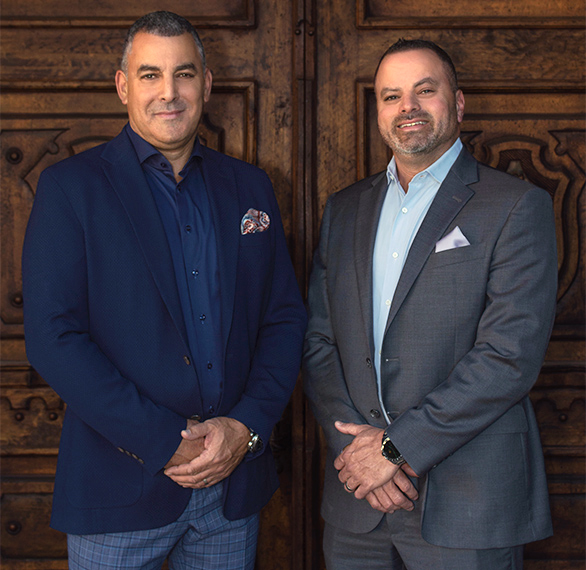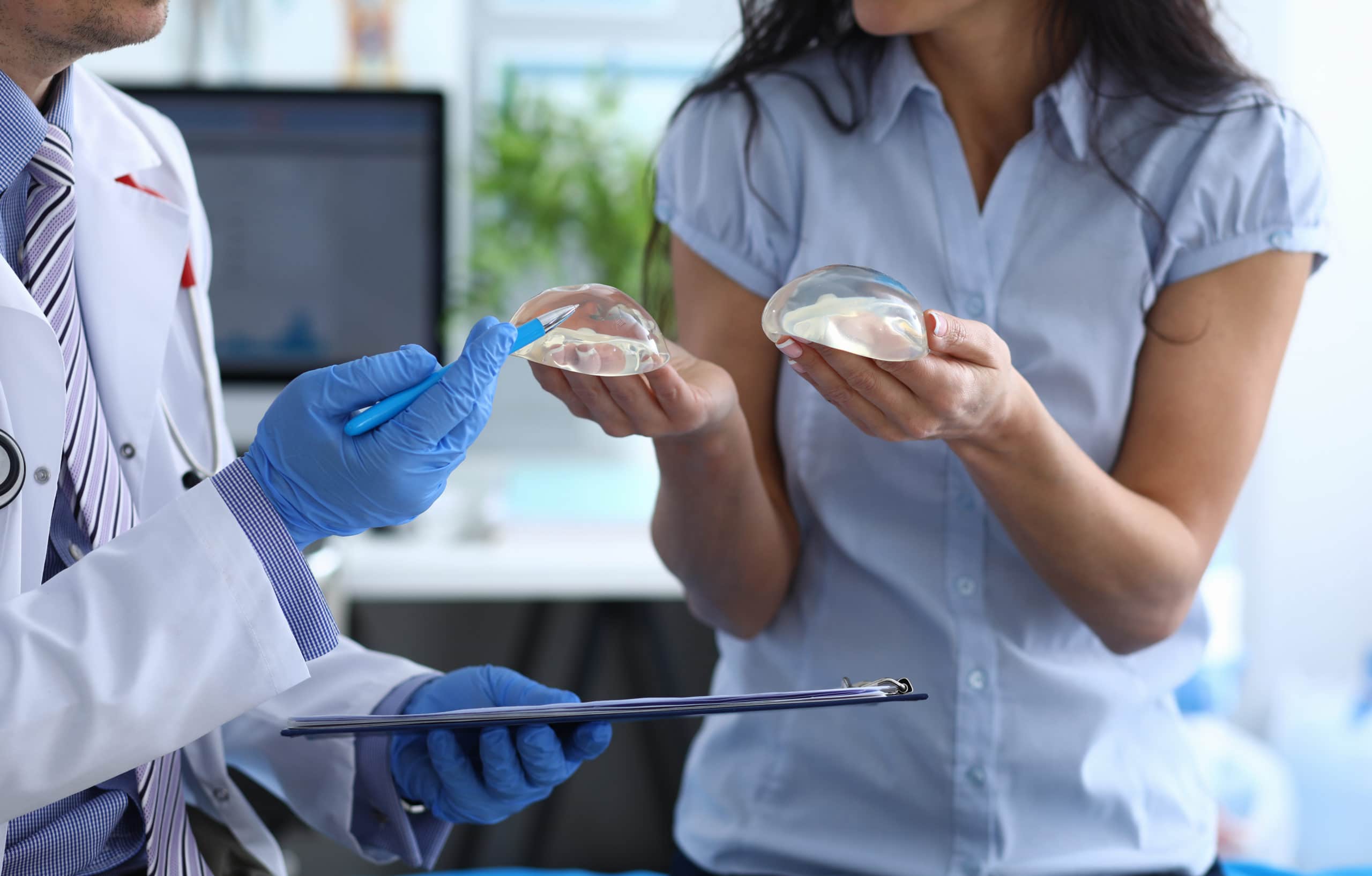Serving Phoenix, Scottsdale, Paradise Valley, and Nearby Areas of Arizona
Even with the best techniques and talents, there are always risks that come with surgeries like breast augmentation. One of the most common complications of breast augmentation is capsular contracture, which can negatively affect your results and health. In this case, a secondary procedure to correct and replace your implants can be beneficial.
Why Choose Breast Implant Removal?
Women who experience complications with their breast augmentation or breast reconstruction results can benefit from a removal or exchange procedure with capsulectomy techniques. Depending on the grade of capsular contracture, the implants can become displaced by a capsule of scar tissue that forms around one or both. This can feel hard or even painful.
A breast implant removal or exchange can be an effective way to correct your results and achieve relief from capsular contracture. The benefits of this procedure include:
The procedure provides a variety of benefits, including:
- Removal of hard or painful scar tissue
- Replacement of implants that have become displaced or distorted
- Improvement of the appearance of the breasts that have succumbed to capsular contracture
Each woman is unique in her results after breast augmentation or reconstruction, so a breast implant removal or exchange will be tailored to your specific situation and complications.
Your Customized Breast Implant Removal Procedure
There are a few different techniques and tools that can be used during this corrective procedure. Your plastic surgeon will create the ideal surgical plan for you based on your goals and complications.
Implant Exchange or Removal
Depending on your grade of capsular contracture, your implants may be reinserted during the procedure or removed. Whether you decide to exchange your implants for new ones or remove them completely is up to you. During an exchange procedure, you can opt to keep your same type and size of the implant or choose new ones. If you opt to remove your implants, your plastic surgeon can discuss your options for rejuvenating your breasts after the implants are removed using specialized techniques.
Capsulectomy
During a capsulectomy procedure, the layer of scar tissue that surrounds the implant is removed using surgical techniques. The process of forming scar tissue is a normal occurrence during any implant surgery and is the natural way that your body ‘quarantines’ the foreign body. It is often made of collagen, fibroblasts, and blood vessels. This only becomes problematic when it begins to displace the implant or cause pain and discomfort.
Expert Surgeons
SERVING YOU WITH INTEGRITY
Mosharrafa Plastic Surgery has been providing a comprehensive range of plastic surgery services to men and women in the Phoenix area since 1996. Dr. Ali Mosharrafa and Dr. Tamir Mosharrafa were born in the Twin Cities, completed their training in Texas, and have been practicing in the Phoenix area ever since.
Read More
Am I a Breast Implant Removal Candidate?
It is important to note that not every woman who experiences capsular contracture will require corrective surgery. There are four different grades of capsular contracture, called Baker Grade I-IV. In Grade I-II, a normal, soft, or slightly firm capsule forms around the implant, and the results are successful. In Grades III-IV, the implant will feel firmer and even hard. The implants can also be displaced and look uneven or crooked. During a consultation with our board-certified plastic surgeons, we can assess your results and determine whether you might benefit from a corrective procedure.
Breast Implant Removal Recovery
Your recovery from this procedure will be similar to your recovery from breast augmentation or reconstruction. Your plastic surgeon will ensure you know what to expect and may also provide explicit steps to follow to prevent the formation of capsular contracture in the future. This might include prescribed medications or massages. You can expect to take one or two weeks away from regular activities to rest and recover.
Absolutely the best. Had a breast implant exchange due to a rupture (from another surgeon) and Dr. Ali Mosharrafa made it the easiest surgery ever.
Read Reviews
Why Choose Mosharrafa Plastic Surgery?
At Mosharrafa Plastic Surgery, we offer expert techniques and experience in treating implant complications. During a consultation with our board-certified plastic surgeons, we can discuss your best options for achieving your ideal results and finding relief from complications. To meet with us and learn more, contact our Phoenix office by calling or filling out our online form.
Can breast implants cause autoimmune disease?
No. In spite of recent discussions surrounding breast implants and illness, there is no clear evidence that breast implants cause autoimmune disease.
How common is capsular contracture in breast implants?
The incidence of capsular contracture varies based on many factors, including the incision used, implant type and implant position and surgical technique. Recent reports cite an overall incidence of 0% to 15% over 13 years.
How do you know if my implants are leaking?
In some cases, particularly with saline implants, you may notice a change in the appearance of your breast(s). The best study for detecting a leaking breast implant is an MRI.
How long does it take to recover from breast implant illness?
This is a very difficult question to answer. In cases where a patient recovers from illness without having her implants removed, the illness was not related to her implants. In some cases, removal of implants can lead to immediate improvement in symptoms, although precise explanation of why is not clear. This is important because it is possible that a patient who believes she has BII and has her implants surgically removed, may continue to have the same symptoms after surgery.
Is breast implant illness covered by insurance?
No. Until we have a better understanding as to whether there is any link between breast implants and specific disease, insurance companies do not participate in the treatment of breast implant illness. Women insurance companies may consider breast implant removal medically necessary in some circumstances, such as BIA-ALCL, but they will not cover the cost of breast implant removal for autoimmune disease, connective tissue disorders or other systemic illness.
What are the symptoms of breast implant illness?
This is highly individual as no clear guidelines have been established for the diagnosis. Reported symptoms include chronic pain, fatigue, anxiety, GI problems, memory loss, depression, sleep disturbances, and many others.
What are the symptoms of silicone toxicity?
Silicone toxicity more accurately describes a condition related to the injection of liquid silicone. Systemic exposure to silicone from even a leaking silicone breast implant is extremely low. In fact, studies suggest that women get more silicone exposure from deoderants and shampoos than from silicone breast implants.
What breast implants are linked to lymphoma?
Thus far, only implants with a textured outer surface have been linked to lymphoma (BIA-ALCL). There has been no link between smooth surfaced implants and lymphoma.
Why I removed my breast implants?
Some people remove breast implants due to complications from the procedure, scar tissue forming around the implants, or the implant leaking.
Can you die from breast implants?
The only potentially fatal condition known to be caused by breast implants is breast implant associated anaplastic large cell lymphoma (BIA-ALCL). While there have been deaths from this extremely rare disease, most were cases that were not diagnosed at initial presentation. Now that the signs and symptoms of the disease are better understood, it is almost always diagnosed at a stage when it is still easily cureable.
How do I prepare for breast implant removal?
It is important that you have a sense of your natural volume, so that you are aware of your breast size following implant removal. Also, speak with your plastic surgeon about the possible need for a lift if removing your implants is likely to leave you with an unsatisfactory shape.
How much does it cost to have breast implants removed?
This varies, but typically ranges from $4000 to $5000 for implant removal.
How often does breast implant illness occur?
It is very difficult to quantify the magnitude of breast implant illness as there are no established criteria for the diagnosis. There are certainly many women with breast implants and signs and symptoms of illness. The challenge is identifying which of these patients, and which of the symptoms, may be related to breast implants. Studies meant to clearly demonstrate a link between breast implants and breast implant illness have been inconclusive.
Is removal of breast implants dangerous?
No. There is little or no danger associated with removal of breast implants.
What does capsular contracture look like?
Capsular contracture typically presents with a breast that feels firm. If it progresses, it can cause visible distortion of the breast.
Can breast implants cause cellulitis?
There are many potential causes of cellulitis, or an infection involving the skin. These include surgery, minor trauma (cuts or scrapes), blocked pores, acne, ingrown hairs or other primary skin conditions. Implants themselves are not typically the cause of the cellulitis. Cellulitis of the breast following implant surgery may be a sign of a more serious infection and should be evaluated immediately by your doctor.
Can breast implants get infected years later?
Can breast implants last a lifetime?
Yes. We have seen implants last for 40 years or more.
Do breast implants cause health problems?
The only health problem that has been definitively linked to breast implants is breast implant associated anaplastic large cell lymphoma (BIA-ALCL). This extremely rare form of lymphoma has been associated with certain types of breast implants with a textured outer surface. Many of these implants have been recalled as the link between the implants and the disease is further investigated. Fortunately, most cases of BIA-ALCL are easy to diagnose and cure.
What are the early signs of capsular contracture?
Firmness of the breast or breasts is typically the first sign of capsular contracture.
What breast implants have been recalled?
Textured implants manufactured by Allergan have been voluntarily recalled while their association with BIA-ALCL is investigated. These are considered macro-textured devices. Micro-textured breast implants are still available.
Can breast implants cause pain years later?
This is extremely rare. There have been cases of severe, delayed capsular contracture years after implantation that progress to cause breast pain. This can be treated by treating the contracture.
Can saline implants cause autoimmune problems?
There is no scientific evidence that any implant, silicone or saline, causes autoimmune disease.
Can you get your breast implants removed?
Yes. Breast implants can be removed surgically.
Do breast implants sag over time?
Gravity does have an effect on breast implants and women with implants will see a change in shape over time. In general, the changes to the implant are less apparent than changes to natural breast tissue over time.
How is BIA ALCL diagnosed?
BIA-ALCL most commonly presents several years after augmentation with textured implants as a sudden swelling of one or both breasts (i.e. late seroma). Diagnosis can be made by sampling the fluid around the implant and sending it for testing in a lab.
How often should breast implants be checked?
Regular self breast examination should be done by every woman, with or without implants, every month. Implants should be checked by a physician and/or imaging if any change is detected. Manufacturers recommend regular MRI's to evaluate for “silent leak,” and this should be discussed with your surgeon.
What happens if a breast implant pops?
Implants to not “pop” like a balloon. Over time, the outer shell of the implant can develop a small hole. In the case of silicone gel implants, this may not produce any detectable change. If a saline implant leaks, there is typically a noticeable change in volume.
What happens if breast implants are not replaced?
If the implants are intact, and are not causing capsular contracture or any other problems, they do not need to be replaced. Leaking implants should be replaced if there are no health contraindications. If a patient has a ruptured silicone implant, but is not a suitable candidate for surgery, there is no evidence that the device poses a direct health threat.
What is implant bottoming?
If the soft tissue support in the lower portion of the breast is not adequate to support the implant, the implant can settle into a low position, compromising the shape and causing the nipple to look too high. This is called “bottoming out,” and can usually be corrected by providing better support in the lower pole of the breast.
What percentage of breast implants rupture?
This varies by implant type, and nature of the surgery (cosmetic vs reconstructive vs revision). Currently in the U.S. implant rupture rates range from 1% to 18% at 10 years.
When should you have breast implants replaced?
Implants should be replaced if they are ruptured or if there is capsular contracture or if the patient desires a change in volume.
Will capsular contracture go away?
There have been cases of capsular contracture that have resolved spontaneously without treatment.
Recent Blog Post:
What to Expect After Having Your Breast Implants Removed
Read More



 Scroll
Scroll